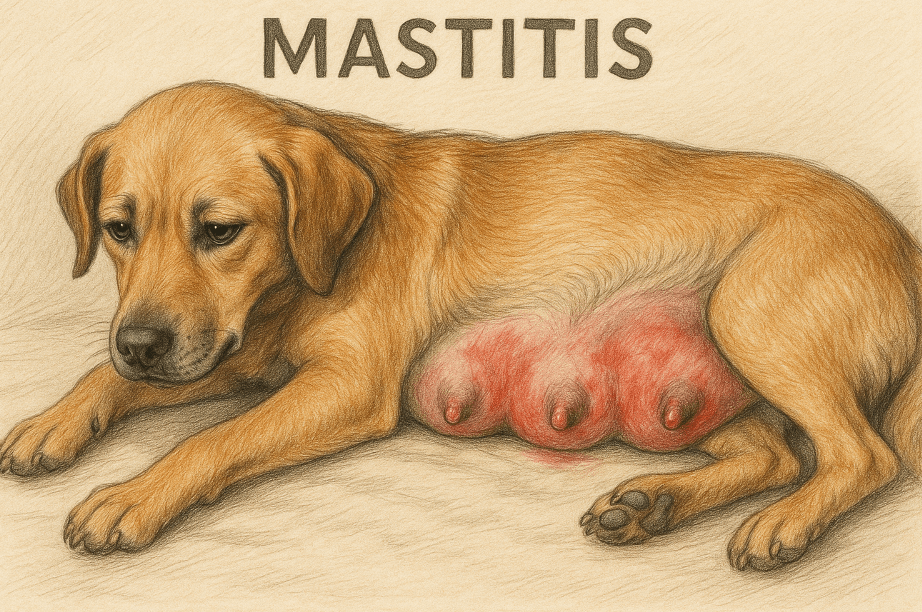Mastitis in Dogs: Understanding, Identifying, and Treating This Painful Condition
Mastitis in dogs is a condition that affects the mammary glands, often causing discomfort or even severe pain for your furry companion. While it’s most commonly seen in nursing mothers, mastitis can occur in any female dog, regardless of whether they’ve given birth. This inflammation of the mammary tissue can lead to serious complications if left untreated, making early detection and proper care essential.
In this blog post, we’ll explore what mastitis is, how to recognize its symptoms, and the steps you can take to ensure your dog receives the treatment she needs. Whether you’re a breeder, a pet parent, or simply someone who wants to stay informed, this guide will help you navigate mastitis in dogs with confidence and compassion.
Symptoms of Mastitis in Dogs
Recognizing the signs of mastitis early is crucial for ensuring your dog receives prompt treatment. Here are some common symptoms to watch for if you suspect your dog may be suffering from this condition.
Swollen or Hard Mammary Glands:
The affected glands may appear larger than usual or feel firm to the touch, indicating inflammation or infection.Discolored or Bloody Discharge:
Abnormal discharge from the nipples, such as pus, blood, or cloudy fluid, is a key indicator of mastitis.Pain or Sensitivity:
Your dog may whimper, flinch, or show signs of discomfort when the affected area is touched.Lethargy and Loss of Appetite:
A dog with mastitis may seem unusually tired or refuse to eat due to the discomfort caused by the condition.Fever or Elevated Body Temperature:
A fever is a sign that your dog’s body is fighting an infection, which may accompany mastitis.
If you notice any of these symptoms, it’s important to consult a veterinarian promptly to prevent further complications.
Causes of Mastitis in Dogs
Understanding the underlying causes of mastitis can help you take preventive measures and address the condition more effectively. Here are some common factors that contribute to the development of mastitis in dogs.
Bacterial Infections:
Bacteria entering through cracked or damaged nipples can lead to infection in the mammary glands.Trauma or Injury:
Physical damage to the mammary tissue, such as bites from puppies or rough handling, can increase the risk of mastitis.Poor Hygiene During Nursing:
Unclean environments or improper care during lactation can expose nursing mothers to harmful bacteria.Hormonal Changes:
Fluctuations in hormones, especially after pregnancy, can make mammary tissue more susceptible to inflammation.Blocked Milk Ducts:
When milk ducts become clogged, milk buildup can cause irritation and infection in the mammary glands.
By addressing these potential causes, you can reduce the likelihood of mastitis occurring in your dog.
Check this guide 👉Corneal Dystrophy in Dogs: Best 7 Expert Tips!
Check this guide 👉Staph Infection in Dogs: Best 7 Expert Tips!
Check this guide 👉Panniculitis in Dogs: Best 7 Expert Tips!

Preventive Measures for Mastitis | Treatment Options for Mastitis |
|---|---|
Keep nursing areas clean and hygienic | Antibiotics to treat bacterial infections |
Monitor puppies’ feeding behavior | Warm compresses to reduce swelling |
Inspect mammary glands regularly | Pain relief medications for comfort |
Avoid over-milking or forcing milk flow | Manual expression of blocked ducts |
Provide a stress-free environment | Surgery in severe or chronic cases |
How to Care for a Dog with Mastitis at Home
While professional veterinary care is essential, there are steps you can take at home to support your dog’s recovery from mastitis. These measures can complement medical treatment and promote healing.
Keep the Area Clean:
Gently clean the affected mammary glands with warm water or a mild antiseptic solution to prevent further infection.Apply Warm Compresses:
Use a warm, damp cloth on the swollen area to help reduce inflammation and encourage milk flow.Monitor Feeding Behavior:
Ensure puppies are latching properly and not causing additional trauma to the nipples during nursing.Encourage Rest and Comfort:
Provide a quiet, comfortable space for your dog to rest and recover, minimizing stress and physical activity.Administer Medications as Prescribed:
Follow your veterinarian’s instructions carefully when giving antibiotics or pain relief medications.
With attentive home care, you can help your dog heal faster and reduce the risk of recurrence.
When to Seek Veterinary Help for Mastitis
While some cases of mastitis can be managed at home, certain situations require immediate veterinary attention. Knowing when to seek professional help ensures your dog receives the care she needs.
Severe Swelling or Abscess Formation:
If the mammary gland becomes extremely swollen or develops an abscess, veterinary intervention is necessary.High Fever or Systemic Symptoms:
A fever above 103°F (39.4°C) or signs of systemic illness like vomiting or diarrhea warrant urgent care.Refusal to Nurse or Eat:
If your dog stops feeding her puppies or eating herself, it could indicate a worsening condition.Bloody or Pus-Filled Discharge:
Abnormal discharge that worsens or persists requires evaluation to rule out serious infections.Chronic Recurrence of Mastitis:
Repeated episodes of mastitis may signal an underlying issue that needs specialized treatment.
Prompt veterinary care can prevent complications and ensure a full recovery for your dog.
Common Misconceptions About Mastitis in Dogs
There are several misconceptions about mastitis that can lead to confusion or delayed treatment. Clearing up these myths helps ensure better care for affected dogs.
Mastitis Only Occurs in Nursing Mothers:
While most cases involve lactating females, non-nursing and spayed dogs can also develop mastitis.It Always Requires Surgery:
Mild cases often respond well to antibiotics and home care, avoiding the need for surgical intervention.All Discharge Indicates Mastitis:
Not all nipple discharge is a sign of infection; however, persistent or abnormal discharge should be evaluated.Mastitis Is Rare in Dogs:
Though not as common as other conditions, mastitis can affect any female dog, especially those who have recently given birth.Home Remedies Alone Are Enough:
While supportive care is helpful, veterinary diagnosis and treatment are critical for resolving mastitis effectively.
Dispelling these myths ensures a better understanding of this condition and its management.
Breeds More Prone to Mastitis
Certain breeds may be at higher risk for developing mastitis due to genetic predispositions or anatomical factors. Being aware of these tendencies allows for proactive monitoring and prevention.
Small Breeds Like Chihuahuas and Toy Poodles:
Their smaller size can make mammary tissue more vulnerable to trauma or blockages.Large Breeds Like Labrador Retrievers:
Larger breeds may experience hormonal fluctuations that increase susceptibility to mastitis.Brachycephalic Breeds Like Bulldogs:
These dogs often struggle with overall health issues, including reproductive complications.Breeds Prone to False Pregnancies:
Dogs prone to false pregnancies, such as German Shepherds, may develop mastitis due to hormonal changes.Breeds with High Litter Sizes:
Breeds like Beagles or Boxers, known for large litters, face increased risks due to frequent nursing demands.
Understanding breed-specific risks helps tailor preventive strategies for your dog.
Long-Term Effects of Untreated Mastitis
If left untreated, mastitis can lead to serious complications that impact your dog’s health and quality of life. Recognizing these potential outcomes underscores the importance of timely intervention.
Abscess Formation:
Untreated infections can result in painful abscesses that require surgical drainage.Sepsis or Bloodstream Infection:
Bacteria from the infected gland may enter the bloodstream, leading to life-threatening sepsis.Permanent Damage to Mammary Tissue:
Chronic inflammation can scar or destroy mammary tissue, affecting future lactation abilities.Loss of Puppies Due to Inadequate Nutrition:
If nursing ceases due to mastitis, puppies may suffer malnutrition or dehydration.Reproductive Health Issues:
Untreated mastitis can lead to ongoing hormonal or structural problems in the reproductive system.
Addressing mastitis early prevents these long-term consequences and ensures a healthier future for your dog.
Frequently Asked Questions About Mastitis in Dogs
Can spayed dogs develop mastitis?
Yes, though rare, spayed dogs can still develop mastitis due to hormonal imbalances or other factors.
Is mastitis contagious to other dogs?
No, mastitis itself isn’t contagious, but poor hygiene can spread bacteria that cause infections.
How long does it take for mastitis to heal?
With proper treatment, mild cases typically resolve within 1-2 weeks, while severe cases may take longer.
Can mastitis affect male dogs?
While extremely rare, male dogs with mammary tissue abnormalities can develop similar conditions.
What should I do if my dog’s mastitis doesn’t improve?
Contact your veterinarian immediately, as this may indicate a more serious underlying issue.
Supporting Your Dog Through Mastitis
Mastitis in dogs is a challenging condition, but with early detection, proper treatment, and attentive care, most dogs recover fully without lasting effects. By staying informed about the symptoms, causes, and treatment options, you can play an active role in your dog’s recovery and well-being. Remember, your veterinarian is your best resource for addressing mastitis, so don’t hesitate to reach out if you suspect your dog is suffering. With love, patience, and the right interventions, you can help your furry friend overcome mastitis and return to her happy, healthy self.
Keeping Your Dog Safe This Summer: Best 7 Expert Tips! – Learn how to protect your pup from heatstroke, dehydration, and more this summer. Stay safe!
When Was Cat Food Invented? Best 7 Expert Tips! – Discover the history, key milestones, and evolution of cat food from scraps to scientifically balanced diets.
When Was Dog Food Invented? Best 7 Expert Tips! – Discover the origins, evolution, and milestones of dog food, and how it transformed pet nutrition over time.
Kintamani Dutch Shepherd Mix: Best 7 Expert Tips! – Discover the perfect blend of loyalty, agility, and charm with this unique hybrid. Learn expert care tips now!




